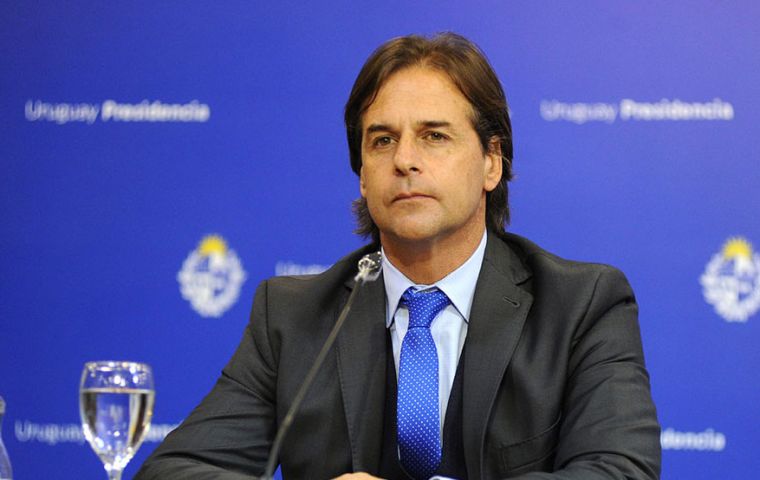MercoPress. South Atlantic News Agency
All Uruguayan students will be back in school by the end of June in a three stage calendar
 President Lacalle Pou and the head of ANEP making the announcements (Pic Presidencia)
President Lacalle Pou and the head of ANEP making the announcements (Pic Presidencia) Uruguayan students will be returning to face-to-face classes from June following a three-stage calendar and with voluntary assistance, the country’s president, Luis Lacalle Pou, reported on Thursday.
“We have very important support from Uruguayan scientists, who developed a protocol that was discussed and consulted with education, sanitary and union authorities,” the president said at a press conference after meeting Thursday with the advisory committee on COVID-19. Uruguay suspended all face-to-face classes on March 13, when it detected the first cases of coronavirus and declared a “health emergency”, and at the end of April it enabled the voluntary return to rural schools in all departments, with the exception of Montevideo and Canelones, with an attendance of around 50%, as detailed this Thursday by Lacalle Pou.
First, on June first students from rural schools across the country will return to classrooms and, except in Montevideo and the metropolitan area, the centers of students with particular educational and social vulnerability, special education schools and the last Baccalaureate and professional training course (UTU).
On June 15, the tour will be enabled in early childhood and initial education centers (up to 5 years old) throughout Uruguay, as well as the last year of Bachillerato and UTU in Montevideo. Also on this date, primary schools and secondary schools will be enabled, except in the capital and the metropolitan area.
Finally, on June 29, the students not included in the previous stages will return to the classrooms. The educational days will be less than four hours a day and the entrance to the centers will be staggered to ensure the minimum distance, said the president of the National Administration of Public Education Council (ANEP), Robert Silva, who qualified that it will be discussed with the centers how the teaching groups will be divided so that they come on different days.
In addition, on May 25 the members of the teaching and management teams may return to the centers, who will not undergo COVID-19 diagnostic tests, as happened with 300 rural teachers, unless there are medical indications for it.
“We take this step because the risk is minimal; otherwise we would not take it,” said Lacalle Pou, who also stressed that in no case will the level of demand be lowered to pass the course “because it is bread for today and hunger for tomorrow”.
It was also revealed that the July holidays usually two weeks will be limited to a week beginning July 7.
According to the latest official data, Uruguay registers 749 positive cases for COVID-19 and 20 deaths since March 13 when the sanitary emergency was established. The number of active cases is 135, with five under ICU care and with 594 recovered.




Top Comments
Disclaimer & comment rulesCommenting for this story is now closed.
If you have a Facebook account, become a fan and comment on our Facebook Page!